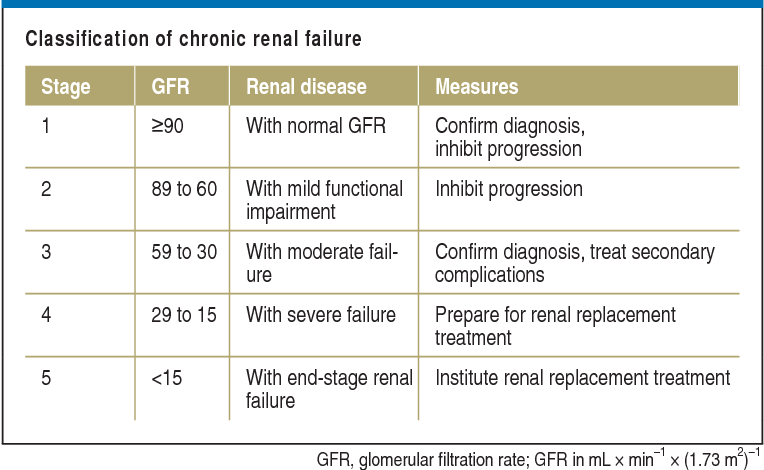
What is Chronic Kidney Disease?
Slow, progressive, and irreversible damage to the kidneys due to any cause, resulting in a gradual decrease in kidney function, is called Chronic Kidney Disease (CKD). If kidney disease gets worse, wastes can build up to high levels in our blood. We may develop complications like high blood pressure, water retention, anemia (low hemoglobin), weak bones, poor nutritional health, and nerve damage. CKD also increases the risk of having heart attacks and brain strokes. These problems may happen slowly over time or may present catastrophically. Early detection and treatment can often keep chronic kidney disease from getting worse.
There are 5 stages of CKD depending on the GFR. For the 5 stages of CKD click here. As kidney disease progresses, it eventually leads to kidney failure, thus requiring dialysis or kidney transplantation.
Measuring Kidney Function
The working of the kidneys is measured by a simple blood test called creatinine. In normal adults, the serum creatinine is usually below 1 mg/dl. This corresponds to 100% functioning of the kidneys. The functioning is usually talked about in terms of GFR (Glomerular Filtration Rate). To know your kidney function, use the KIDNEY FUNCTION CALCULATOR.
A normal adult male will have a kidney function of about 125 ml/min of GFR. A female of the same age and weight will have about 15–25% lesser (due to lesser muscle mass). As kidney function or GFR decreases, the creatinine increases. Surprisingly, a creatinine of just 1.5 mg/dl corresponds to a GFR of about 60, a loss of 50% function!!
- A creatinine of 2 mg/dl is about GFR 30.
- A creatinine of 3 mg/dl is about GFR 20.
- A creatinine of 4 mg/dl is about GFR 15.
- A creatinine of 5 mg/dl is about GFR 10.
If a patient’s GFR falls below 10, the excretion of toxic wastes is no longer adequate to maintain life and the patient should be considering dialysis or kidney transplantation.
What are the symptoms of Chronic Kidney Disease?
Most organs in our body, including the kidneys, show no symptoms until more than 80–90% of their function is gradually lost. Waiting for symptoms may make it too late to detect treatable conditions. However, certain symptoms may indicate the onset of chronic kidney disease (CKD):
- Breathlessness upon walking short distances.
- Breathlessness upon lying down.
- Frothy or foamy urine.
- Blood in urine.
- Swollen feet and ankles.
- Puffiness around the eyes, especially in the morning.
- Increased need to urinate, particularly at night.
- Passing less urine, especially less than 500 ml per day.
CKD can develop at any age, but certain factors increase the risk:
- Diabetes
- High blood pressure
- Family history of kidney failure
- Age (older adults are at higher risk)
- Frequent use of painkillers
- Chronic conditions such as rheumatoid arthritis or systemic lupus erythematosus (SLE)
What are the Causes of Chronic Kidney Disease?
The common causes of chronic kidney disease (CKD) include:
- Diabetes: Up to 50% of CKD cases are linked to diabetes, making it a primary cause.
- Hypertension: High blood pressure damages the kidneys over time, contributing to CKD.
- Medications: Chronic use of painkillers and other kidney-toxic medications can lead to kidney damage.
- Nephrotic Syndromes: These conditions cause the kidneys to leak proteins into the urine.
- Glomerulonephritis: Characterized by the loss of blood and proteins in the urine due to inflammation of the glomeruli.
- Hereditary Conditions: Genetic conditions, like polycystic kidney disease, increase CKD risk.
- Obstruction to Kidneys: Blockages from kidney stones, cancers, or strictures disrupt kidney function.
- Chronic Kidney Infections: Recurrent infections can gradually impair kidney function.
- Unknown Causes: In some cases, the cause of CKD remains unidentified.
Stages of CKD
Chronic Kidney Disease (CKD) is classified into five stages based on the Glomerular Filtration Rate (GFR), reflecting the level of kidney function:
- Stage 1: GFR ≥ 90 ml/min – Kidney function is normal, but there may be early signs of kidney damage.
- Stage 2: GFR 60 - 89 ml/min – Mild decrease in kidney function, with potential signs of kidney damage starting to show.
- Stage 3: GFR 30 - 59 ml/min – Moderate reduction in kidney function.
- Stage 4: GFR 15 - 29 ml/min – Severe reduction in kidney function; preparation for possible renal replacement therapy begins.
- Stage 5: GFR < 15 ml/min – Kidney failure (renal insufficiency), requiring either hemodialysis or kidney transplantation for survival.
How is Kidney Failure Treated?
To treat Chronic Kidney Disease (CKD) effectively, early detection, tailored treatment, and supportive care are essential:
- Early Detection:
- Regular screening is critical to identify kidney damage in its early stages.
- Urine Examination: A test for protein leakage, known as the Protein-to-Creatinine Ratio (ACR), estimates daily protein loss. High levels may indicate kidney damage, though factors like fever or exercise can temporarily affect results, so multiple tests over time may be necessary.
- Blood Creatinine Test: Measuring creatinine levels in the blood, combined with age, race, and gender, helps calculate the Glomerular Filtration Rate (GFR), a key measure of kidney function.
- Managing CKD::
- Once CKD is confirmed, strict control of conditions like diabetes, high blood pressure, and cholesterol is crucial to slow disease progression.
- Fluid Intake and Additional Therapies: Regulating fluid intake and treating associated conditions like anemia, elevated uric acid, and acidosis can help protect kidney health.
- Medications for Blood Pressure: High blood pressure worsens kidney damage, creating a cycle of harm. Medications like Angiotensin-Converting Enzyme Inhibitors (ACEi) or Angiotensin Receptor Blockers (ARBs) reduce blood pressure and decrease nephron pressure, offering protection from further damage.
- Treatment plans are personalized by the nephrologist to meet individual needs, aiming to prevent further kidney function decline.
- Treatment for Advanced CKD (Stage 5 or Kidney Failure):
- If CKD reaches stage 5, where GFR is below 10 ml/min, renal replacement therapy is required to maintain life.
- Hemodialysis: Conducted three times a week, this therapy uses a machine to filter and clean the blood. It can be performed at a dialysis center or, in some cases, at home.
- Peritoneal Dialysis: This method uses the lining of the abdomen to filter blood and is generally performed daily at home. Options include:
- Automated Peritoneal Dialysis (APD): Uses a machine.
- Continuous Ambulatory Peritoneal Dialysis (CAPD): Done manually, without a machine.
- The nephrologist will discuss these options with the patient and family to determine the best fit for their lifestyle and medical needs.
- Kidney Transplantation:
- In advanced kidney failure, transplantation is often the most effective solution. A donor kidney may come from:
- A Deceased Donor (also called a Cadaver donor).
- A Living Donor, who may be a blood relative or an unrelated donor.
- Kidney transplants have high success rates, offering improved quality of life and longer-term kidney function. The nephrologist provides guidance through each step of the process, ensuring the chosen treatment aligns with the patient’s condition and lifestyle, supporting them throughout their treatment journey.
- In advanced kidney failure, transplantation is often the most effective solution. A donor kidney may come from:
If you’re experiencing symptoms of Chronic Kidney Disease or have been diagnosed with a related issue, it is essential to seek specialized care.
Dr. Kamal Kiran offers expert treatment and personalized care plans to help manage your condition and improve your quality of life. Trust his expertise for top-notch nephrology services tailored to your unique needs.
Facts about Chronic Kidney Disease (CKD)
- About 1 out of every 9 adults have CKD.
- Early detection can help prevent the progression of kidney disease to kidney failure.
- Heart disease is the major cause of death for all people with CKD
- Hypertension causes CKD and CKD causes hypertension.
- Persistent proteinuria (protein in the urine) means CKD is present.
- High risk of kidney failure includes those with diabetes, hypertension and family history of kidney failure.
- Two simple tests can detect CKD: Urine protein and serum Creatinine.
- Glomerular filtration rate (GFR) is the best estimate of kidney function.
